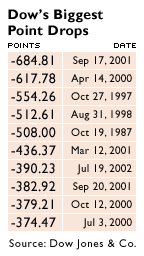NEW YORK (CNN/Money) -
Typically, the anniversary of a dubious market milestone means commemorating just how much stocks have rallied from Massive Selloff X or Big Tumble Y.
But that won't happen Tuesday, a year after the Dow Jones industrial average suffered its biggest one-day point drop in history.
The Dow fell more than 684 points on Sept. 17, 2001, when the U.S. stock market reopened after the 9/11 terrorist attacks. It went on to crumble another 685 points by week's end.
A furious two-month rally erased all those losses, but the gains didn't hold. And as a result, the index of 30 blue chip stocks stands below its dramatic year-ago drop, challenging the "buy-on-the-dips" maxim that worked for two decades.

"It's almost like we round-tripped, in a way," said Richard Campagna, managing director at Shaker Investments in Cleveland.
The trip began a year-ago Tuesday when the stock market opened to pent-up selling demand six days after terrorists attacked New York's World Trade Center and the Pentagon near Washington, D.C. The Dow fell 684.81 points, or 7.13 percent, to close at 8,920.70 that day, breaking the previous record by 67 points.
For the century-old Dow, the No. 1 point loss didn't crack the top 10 in percentage terms. That list is led by the 22.61 percent drop on October, 19, 1987, Black Monday.
But when the market's post-9/11 slide came to a halt Sept. 21, the Dow had endured its worst weekly performance in 61 years, dropping 14.26 percent over five sessions.
"At that point, I had thought we had finally gotten back to fair value on the market," Campagna said.
Michael Cohen, director of research at Pacific American Securities LLC, in San Diego, agreed.

"I believed that we had made the lows," Cohen said. "There was this feeling that finally we had bottomed. The market had a greater sense of security."
A year later, the bounce back -- so common after big selloffs like those in 1987 and 1998 -- has not occurred, even though large-scale terrorism didn't resurface during the next 12 months.
Instead, between December and July, Enron, Kmart, Global Crossing, Adelphia Communications and WorldCom would file for bankruptcy, listing combined assets of more than $235 billion.
Executives at WorldCom, Tyco International, Adelphia and ImClone Systems were arrested and charged with various criminal acts that inflicted harm on their companies.
And the inventory buildup and overinvestment of the 1990s technology boom hung around with the persistence of an Internet pop-up ad.
By July 23, the Dow fell through its September low as the bankruptcies, corporate scandals and 1990s hangover combined to keep investors wary about stocks.
"There's a fatigue factor on investors," Pacific American Securities' Cohen said. "Investors have been beaten over the head for so long, they are not in the mood to throw their money out in front" of stocks.
The Dow stands 6.7 percent below its close on Sept. 17, 2001, and 1 percent above where the index fell to on Sept. 21, 2001.
Shaker Investments' Campagna feels more comfortable that the market's bottom is closer now, saying the economy is showing some signs of improvement. The corporate managers he speaks to say their businesses, at least, are not getting worse.
That said, Campagna suspects that any sizable market advance could be a long time coming
"The level of trust has been eroded and I think that will take years to build back up again," he said.

|

